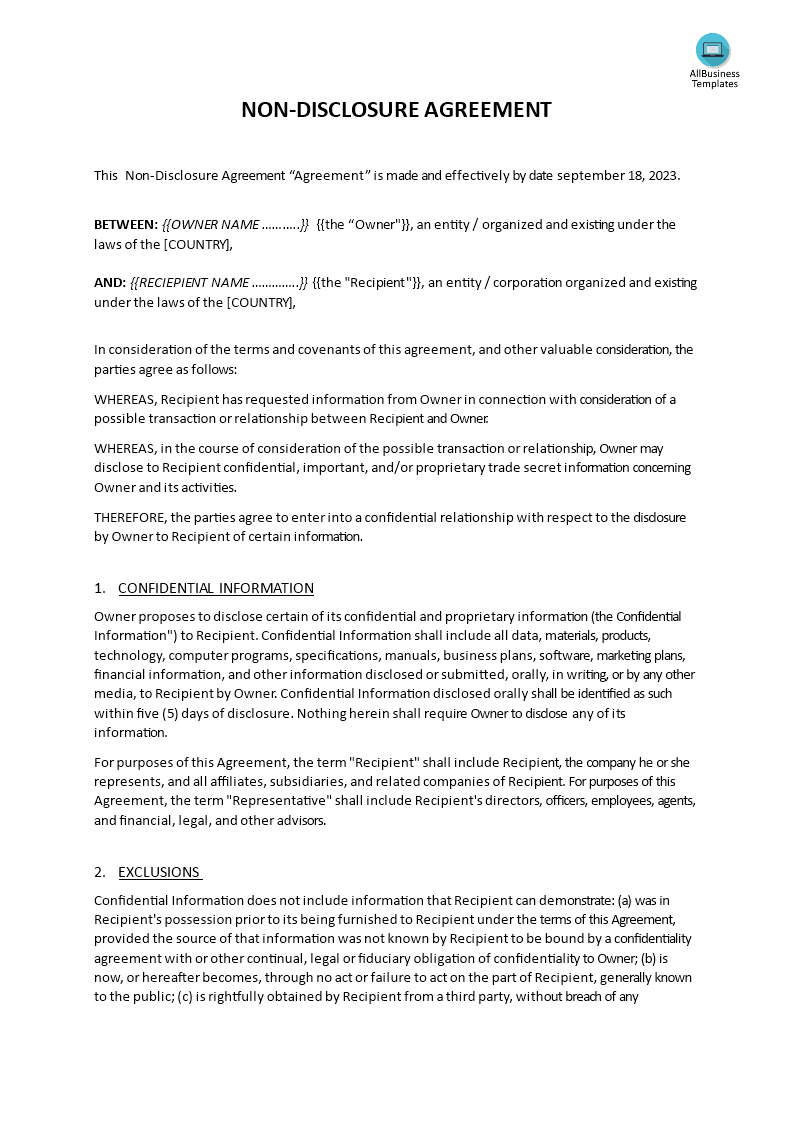Non Disclosure Agreement Template
Save, fill-In The Blanks, Print, Done!

Download Non Disclosure Agreement Template
Today: USD 3.99
Download It Now

Available premium file formats:
Microsoft Word (.docx)Other languages available:
- This Document Has Been Certified by a Professional
- 100% customizable
- This is a digital download (30.64 kB)
- Language: English
- You will receive a link to download the file as soon as your payment goes through.
- We recommend downloading this file onto your computer.
How can you draft a basic non-disclosure agreement? What is the significance of a non-disclosure agreement? Download our template which provides a clear and comprehensive agreement between two parties, protecting confidential information from disclosure. Access our sample template right away!
Non-Disclosure Agreements are used in various contexts, including:
A Non-Disclosure Agreement (NDA), also known as a confidentiality agreement or a secrecy agreement, is a legally binding contract between two or more parties that outlines the sharing of confidential information and restricts the recipient from disclosing that information to third parties or using it for unauthorized purposes. NDAs are commonly used in business, legal, and personal contexts to protect sensitive information and trade secrets.
Here are the key components typically found in a Non-Disclosure Agreement:
- Parties: The NDA will identify the parties involved, including the disclosing party (the entity or individual sharing the confidential information) and the recipient party (the entity or individual receiving the information).
- Definition of Confidential Information: The agreement defines what information is considered confidential. This can include trade secrets, business plans, financial data, proprietary technology, customer lists, product designs, and any other sensitive or proprietary information.
- Obligations of the Recipient: The NDA outlines the obligations and responsibilities of the recipient concerning the confidential information. This often includes clauses that require the recipient to keep the information confidential, not disclose it to third parties, and not use it for unauthorized purposes.
- Permitted Disclosures: The agreement may specify exceptions or circumstances under which the recipient is allowed to disclose confidential information. Common exceptions include disclosures required by law or court order, disclosures to employees or agents with a legitimate need to know, and disclosures with the disclosing party's written consent.
- Duration: NDAs typically have a specified duration during which the confidentiality obligations are in effect. This can be a fixed term or continue indefinitely, often with provisions stating that the obligations survive the termination of the agreement.
- Consequences of Breach: The NDA should outline the consequences of a breach, including any legal remedies or damages that may be pursued by the disclosing party.
- Governing Law and Jurisdiction: The agreement will specify the governing law that applies and the jurisdiction where legal disputes will be resolved.
- Severability: A severability clause ensures that if any provision of the NDA is found to be invalid or unenforceable, the remaining provisions remain in full force and effect.
- Entire Agreement: This clause states that the NDA represents the entire agreement between the parties regarding the subject matter and supersedes any prior or contemporaneous agreements or understandings.
- Signatures: Both parties must sign and date the NDA to indicate their agreement to its terms.
- Business negotiations: When two companies are discussing potential partnerships, collaborations, mergers, or acquisitions, they may exchange sensitive financial and operational information.
- Employee contracts: Employers may require employees to sign NDAs to protect trade secrets and proprietary information.
- Intellectual property protection: When inventors, artists, or creators share their ideas or works with potential investors or business partners.
- Vendor relationships: Businesses may require their vendors or suppliers to sign NDAs to protect their supply chain and proprietary processes.
- Contractors and freelancers: When hiring contractors or freelancers who will have access to sensitive company information.
Non-Disclosure Agreements are legally binding contracts, and the terms and conditions should be carefully reviewed and negotiated by all parties involved. Consulting with legal counsel is advisable, especially when dealing with complex or highly sensitive information.
We provide a professional 6-page detailed Non-Disclosure Agreement Template which can be signed between at least two Parties to agree that one Party (one-sided NDA) or both Parties (mutual NDA) will keep the nonpublic business information, material, knowledge, etc. that is shared confidentially. By signing this, they agree not to disclose information covered by the agreement.
If you are in a situation where you need to create a confidential relationship with another Party, or Parties, this template is going to help you to create the legal foundation to protect the nonpublic business information that you are going to share.
This Non-Disclosure Agreement Template covers the most important subjects, such as:
- confidential information
- exclusions
- term
- confidentiality
- permitted disclosures
- required disclosures
- use
- no license
- return of documents
- no additional agreement
- irreparable harm
- no publicity
- final agreement
- survival
- successors and assigns
- severability
- notices
- no implied waiver
- governing law and equitable relief
- etc.
Other common types of confidentiality agreements, such as the NDA, are Confidential Disclosure Agreements (CDA), Confidentiality agreements (CA), Proprietary information agreements (PIA), or secrecy agreements. Our legal templates are all screened by a Legal professional.
Download this Non Disclosure Agreement Template if you need to protect your company or yourself in a business relationship to not disclose secret information, and save time, costs, and effort by using our Professional Template!
DISCLAIMER
Nothing on this site shall be considered legal advice and no attorney-client relationship is established.
Leave a Reply. If you have any questions or remarks, feel free to post them below.
Complete Startup Starter Kit
This Startup Starter Kit is a compilation of the most important business, legal and marketing documents to help early-stage startups with all things that are crucial and important!
Read moreRelated templates
Latest templates
Latest topics
- Excel Templates
Where do I find templates for Excel? How do I create a template in Excel? Check these editable and printable Excel Templates and download them directly! - GDPR Compliance Templates
What do you need to become GDPR compliant? Are you looking for useful GDPR document templates to make you compliant? All these compliance documents will be available to download instantly... - Google Docs Templates
How to create documents in Google Docs? We provide Google Docs compatible template and these are the reasons why it's useful to work with Google Docs... - IT Security Standards Kit
What are IT Security Standards? Check out our collection of this newly updated IT Security Kit Standard templates, including policies, controls, processes, checklists, procedures and other documents. - Letter Format
How to format a letter? Here is a brief overview of common letter formats and templates in USA and UK and get inspirited immediately!
cheese
